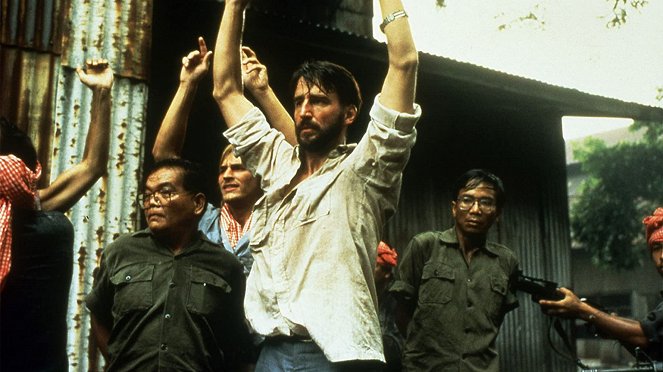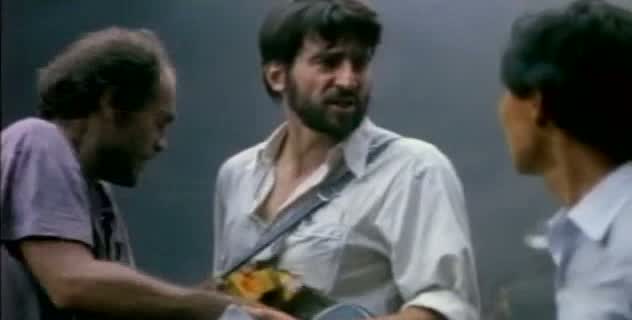Directed by:
Roland JofféScreenplay:
Bruce RobinsonCinematography:
Chris MengesComposer:
Mike OldfieldCast:
Sam Waterston, Haing S. Ngor, John Malkovich, Julian Sands, Craig T. Nelson, Spalding Gray, Bill Paterson, Athol Fugard, Mark Long, Patrick Malahide (more)Plots(1)
A photographer is trapped in Cambodia during tyrant Pol Pot's bloody "Year Zero" cleansing campaign, which claimed the lives of two million "undesirable" civilians. (official distributor synopsis)
Videos (1)
Reviews (9)
How is it possible that such powerful content can be expressed through masterful form? With this film, a picture often says more than a few thousand words. Rather than an uncompromising anti-communist agitprop, The Killing Fields is a gripping story about the distressing reunion of two lifelong friends. With great distinctiveness and candor, the first half skillfully captures the disarray of a state affected by the clenched fist of the communist revolution. The second half then shows with what coldness the social stratum of intelligence can be liquidated. The relentlessness of the labor camp, from which there is essentially no escape, then escalates into horrifying images dominated by a little girl with a blue plastic bag, and the subsequent transition to the "killing field." The ending becomes even more powerful and emotional, causing even the toughest person to momentarily forget their toughness and be deeply moved.
()
I would make all voters of the Communist Party watch this film, because this is what it looks like when communism is put into practice. Joffé perfectly portrayed the dark atmosphere of genocidal Cambodia under the Khmer Rouge, the communist uniformity and brainwashing makes you sick, many scenes will give you the chills. In Pol Pot’s Cambodia, almost anything was possible in terms of evil and trampling on human dignity, so it is not surprising that even a "little girl with a blue plastic bag" can easily become synonymous with death. The performance of Cambodian non-actor Haing S. Ngor as Dith Pran, an interpreter who experiences the Pol Pot regime first-hand, is riveting and rightfully Oscar-winning. Interesting fact, Haing himself went through the hell of the Pol Pot regime, which makes his performance all the more believable.
()
At first it looks like just a great performance by Sam Waterston, but this film develops incredibly, until you realize that it's an incredibly powerful drama, both socially and humanly. The war is depicted without any embellishment, but we are not on the battlefield for most of the time. This makes the impact on the viewer even greater, who sees the outcome.
()
The Oscars went to the right people. The Killing Fields is an extraordinary film (not only) in the contemporary context with excellent camera work, a strong story, and high-quality casting. It is not the fault of the creators that some people lack context. At that time, it was about fresh events when the genocide of the Khmer Rouge on their own nation shook public perception worldwide. With the passage of the decades, a political film has become a historical film. But that is an inevitable process. The story is not encrypted in any way, and to understand its background it is enough to read some basic information about Cambodia in the 1970s. The film depicts the meeting and developing friendship of an American reporter with his local guide during the height of the Indochina War. After the fall of the pro-American regime, foreign reporters leave the country, but the native interpreter gets caught up in the machinery of the ultra-left regime and survives only with great effort and a good dose of luck. The drama cannot overshadow the fact that it is directed by Western filmmakers and intended for a Western audience - a purely Cambodian approach to the material would be even more depressing, darker, and more hopeless. But certainly also more atmospheric. Even so, the shows us a number of extraordinary scenes of war chaos and the suffering of prisoners in reeducation camps and subjects of the regime. Joffé shoots in a documentary style, and you simply have to believe his depiction of the landscape exposed to horrors. Mike Oldfield's impressive sound design is also worth mentioning. Haing S. Ngor, an immigrant and non-actor, a doctor by profession, won the Oscar for Best Supporting Actor for his role as Dith Pran. It is certainly arguable that American bombardment of the landscape is responsible for the extreme brutality of the Khmer Rouge. However, significantly larger and more systematic bombings in Vietnam did not lead to the radicalization of the local regime. The repulsive nature of the Khmer Rouge regime is owed in part to the fact that their leaders drew inspiration from Maoism and Mao's Cultural Revolution of the 1960s. Their profile also manifested through persecution by government authorities. Sihanouk was one of the typical oriental despots, and his secret police tortured and killed people on a whim. Overall impression: 90%.
()
The Killing Fields is a movie where ambition simply oozes out of every frame. I’m not saying it’s bad. Especially when it’s in the hands of a director who knows how to avoid cheap sucking up to the Academy (although Lennon at the end was a step way over the mark). In the first half I couldn’t help asking myself why the story revolves round such an uninteresting, self-centered journalist when his gofer who he treats like shit is a hundred times more interesting. And luckily the filmmakers thought this too and in the second half they put him to the fore. And did well to do it in my eyes. Otherwise the scenes like developing photos in Spartan conditions, the video with Nixon’s speech and shots of the atrocities of the Khmer Rouge cut with Vincerò or lost in the killing fields are such powerful scenes that Roland Joffé has earned my greatest admiration. On the other hand, it doesn’t change the fact that I can see mistakes here. Which I can’t say about his next movie, however much I might want to.
()
Gallery (75)
Photo © Warner Bros. Pictures



Ads